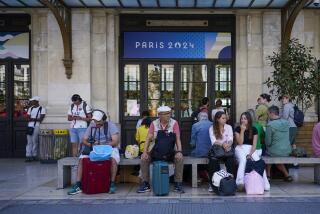Argentine commuter riot spurs a blame game
- Share via
BUENOS AIRES — A day after disgruntled passengers rioted in a historic train station, officials pointed fingers Wednesday while acknowledging that urgent action was needed to correct this capital’s antiquated public transport system.
“We’re going to respond with a swift kick where it’s needed,” vowed Argentine President Nestor Kirchner, labeling as “shameless” government-subsidized private rail operators who fail to provide adequate service. “Our only obligation is to the public.”
The government labeled Tuesday evening’s rampage a “commuter rebellion,” as photos of angry passengers tossing rocks, setting fires and clashing with riot police were flashed around the globe. Authorities reported 25 injuries and 16 arrests during the melee at Constitucion station, a transfer point daily for about 400,000 people, mostly residents of working-class suburbs south of the city.
The violent video from Buenos Aires is at odds with the image of a culturally hip and inviting capital that officials here employ to promote international tourism, which has been booming in recent years. The chaotic transport system is part of the darker side of Argentine society seldom witnessed by foreign visitors frequenting the capital’s trendy cafes and restaurants.
Trains were running again Wednesday as workers hastened to remove broken glass, stones and debris scattered in Constitucion station, which dates from 1925 and was recently refurbished and recognized as one of the architectural gems of a city often compared to European capitals.
While condemning the vandalism, authorities and commuters alike said the rage was understandable given the appalling conditions prevalent in Buenos Aires’ dilapidated commuter trains.
Passengers daily cram into filthy rail cars featuring broken windows, torn seats and no functioning air conditioning or heat. Commuters must also endure chronic delays and cancellations while seldom being informed about what is going on.
“Cattle are transported better than us,” complained Claudia Castillo, 38, a domestic worker who travels daily back and forth through Constitucion station. “In the summer we’re dying of the heat, and in the winter we’re freezing.... It’s crazy.”
Fabian Okier, 38, an electrician, called his daily ride home from work “a living hell,” and described being caught in the midst of Tuesday’s riots.
“People were setting fire to everything, throwing rocks,” Okier recalled. “At one point there was so much fire, smoke and tear gas that we couldn’t see anything.”
Angry commuters have in the past staged protests and even torched rail cars, but Tuesday’s mass revolt was regarded as the most serious incident. The fact that it happened in the midst of an election year, with mayoral balloting in Buenos Aires scheduled for next month and the presidential vote slated for October, added a partisan flavor to the debate.
Kirchner, a leftist with a strong nationalist streak, immediately heaped blame on the privatization drive of the 1990s that turned commuter operations over to private concessionaires. He pledged to seek fines against operators falling down on the job.
But critics noted that the system remains heavily subsidized and that the government also bore responsibility for the chaos.
Train operators argued that their revenue from fares and government subsidies was insufficient to pay for much-needed repairs and upkeep. Lawmakers ensure that fares are kept artificially low, the equivalent of 15 cents for a ride in some cases. But Argentina’s legacy of corruption has left many suspicious about what’s wrong.
Some allege much of the money destined for improving service instead goes into the pockets of officials and transit entrepreneurs. Politically influential transit worker unions demand regular salary increases.
“It’s a labyrinth without an exit,” said Jorge San Martino, an opposition city councilman who heads the council’s transportation committee.
“The politics of subsidy and the murkiness of the fares creates a terrible model that is in permanent crisis,” San Martino added. “It makes it impossible to renew the fleet and perform the necessary maintenance.”
*
Andres D’Alessandro of The Times’ Buenos Aires Bureau contributed to this report.
More to Read
Sign up for Essential California
The most important California stories and recommendations in your inbox every morning.
You may occasionally receive promotional content from the Los Angeles Times.










